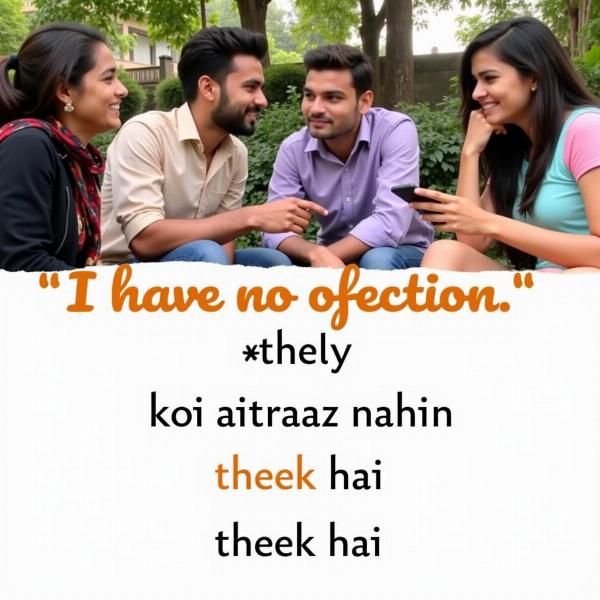Understanding the nuances of expressing agreement or acceptance in a different language can be tricky. If you’re looking for the Hindi equivalent of “I have no objection,” this guide will provide you with various options, along with contextual explanations and cultural insights. This phrase is essential for navigating social and professional situations in India, enabling you to communicate effectively and respectfully.
Different Ways to Say “I Have No Objection” in Hindi
There isn’t one single perfect translation for “I have no objection” in Hindi. The best choice depends on the context and level of formality. Here are some common and accurate translations:
- मुझे कोई आपत्ति नहीं है (mujhe koi aapatti nahin hai): This is the most literal and widely used translation. It’s suitable for both formal and informal settings. “Aapatti” means objection, and “nahin” signifies negation.
- मेरी तरफ से कोई आपत्ति नहीं है (meri taraf se koi aapatti nahin hai): This translates to “From my side, there is no objection.” It emphasizes your personal agreement and is appropriate for formal situations like business meetings or legal proceedings.
- कोई एतराज नहीं (koi aitraaz nahin): “Aitraaz” is another word for objection, and this phrase is a more concise and informal way of expressing agreement. You can use it with friends and family.
- ठीक है (theek hai): This simply means “okay” or “fine.” While not a direct translation, it conveys acceptance and is commonly used in casual conversations.
- मैं सहमत हूँ (main sahmat hoon): This translates to “I agree.” It’s a stronger form of expressing approval and suitable when you actively support the proposal.
Choosing the Right Phrase: Formal vs. Informal
When speaking Hindi, choosing the right level of formality is crucial. Using an informal phrase in a formal setting can be perceived as disrespectful. Conversely, using overly formal language in casual conversations can sound stiff and unnatural.
Formal situations: Use “mujhe koi aapatti nahin hai” or “meri taraf se koi aapatti nahin hai” when addressing superiors, colleagues in a professional setting, or during official proceedings.
Informal situations: “Koi aitraaz nahin” or “theek hai” are perfectly acceptable when talking to friends, family, or in casual social gatherings.
Cultural Considerations
Indian culture often values politeness and indirect communication. While “I have no objection” is a straightforward expression in English, its Hindi equivalents can be softened or elaborated upon to maintain harmony and avoid confrontation. For instance, you could preface your agreement with a phrase like “ji haan” (yes) or “bilkul” (absolutely) to show respect.
Example Scenarios and Usage
- Scenario 1: A colleague proposes a new project idea. You can respond with, “Ji haan, mujhe koi aapatti nahin hai. Yeh ek achha vichar hai.” (Yes, I have no objection. This is a good idea.)
- Scenario 2: Your family is discussing where to go for dinner. You can say, “Koi aitraaz nahin, kahin bhi chalo.” (No objection, let’s go anywhere.)
- Scenario 3: In a legal setting, you might say, “Meri taraf se koi aapatti nahin hai, vakil sahab.” (From my side, there is no objection, lawyer sir.)
 Informal Hindi Phrases for No Objection
Informal Hindi Phrases for No Objection
Expressing Agreement Beyond “No Objection”
While “I have no objection” conveys neutrality, sometimes you want to express stronger agreement or enthusiasm. Here are some Hindi phrases for doing so:
- मुझे बहुत खुशी है (mujhe bahut khushi hai): I am very happy.
- मैं पूरी तरह से सहमत हूँ (main puri tarah se sahmat hoon): I completely agree.
- यह एक बेहतरीन विचार है (yah ek behtarin vichar hai): This is an excellent idea.
Conclusion: Communicating Effectively in Hindi
Mastering the art of saying “I have no objection” in Hindi, along with other expressions of agreement, will significantly enhance your communication skills. By understanding the nuances of formal and informal language, and by considering cultural context, you can navigate social and professional interactions with confidence and respect. Remember to choose the phrase that best suits the situation and your relationship with the other person. “I have no objection meaning in Hindi” now holds no secrets for you!
FAQ:
- What is the most common way to say “I have no objection” in Hindi? Mujhe koi aapatti nahin hai.
- How do I say “I have no objection” formally in Hindi? Meri taraf se koi aapatti nahin hai.
- Is “theek hai” an acceptable way to express “I have no objection”? Yes, in informal settings.
- How can I express stronger agreement than just “no objection” in Hindi? Use phrases like “main puri tarah se sahmat hoon” (I completely agree).
- What are some cultural considerations when expressing agreement in Hindi? Politeness and indirectness are often valued. Consider softening your language or adding respectful phrases.
Meaning-Hindi.in is your trusted partner for all your Hindi translation needs. We offer a wide range of services, from business and legal document translation to website localization and technical manual translation. Our team of expert linguists ensures accuracy, cultural sensitivity, and timely delivery. Need a quick translation or a specialized subject matter expert? We handle it all. Contact us today at [email protected] or call us at +91 11-4502-7584. Meaning-Hindi.in is committed to bridging language barriers and fostering clear communication.